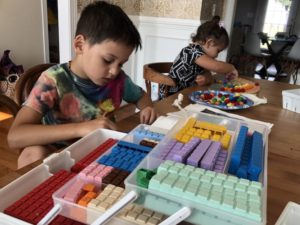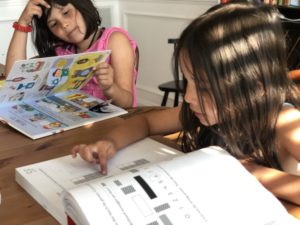
After we’ve made the decision to homeschool, this is how my family moves forward to plan for a successful year!
Write a Mission Statement
This may not even be on radars yet, but it is literally the first thing we’ve done. This has become our reason for homeschooling- our “why” for when times get tough or I need reminding. It has also been our compass. How I try to keep it all prioritized is by referring back to this vision of what we are trying to create; our purpose for homeschooling. This is a family affair and it instantly makes everyone feel more at ease. If nothing else, it’s worth the peace of mind! Check out this link for a great “how to” on creating your mission statement! It’s super easy!
Pick the Curriculum
With a little extra patience, I feel like almost anyone can do it these days. There is an endless supply of resources out there. There are free websites, apps, virtual classes, learning centers outside the home, monthly box subscriptions, workbooks, literature-based curriculums, DVD lectures, games and more! Don’t forget your local community centers, recreation centers and libraries. There are co-ops that are willing to help you take the load off! One thing I recommend is to join a group online and do searches for subjects, then collect the information to compare it. This way, if something doesn’t work for one child or for multiple children, we have other resources we can try. Also, always consider your budget because costs add up. We ask around if we’re interested in a program so that we can see it before we buy it and we make a note about material swaps in our area.

Get Organized
Starting the school year as a homeschooler means that rather than checking off items on the supply list, I’m busy getting my home ready. It’s simple but it can make the difference between a successful year and one that has me scrambling constantly. Also, if our children know where items belong, they are more able to be responsible for their own things. We can’t expect our children to keep things tidy if we aren’t setting the example. This includes some sort of calendar or agenda book that I can use to keep our activities and our days organized behind the scenes so that it runs smoothly, and the kids know what to expect. It will help keep everything calm.
Know the Laws
We have become very familiar with out county’s public school website. I print off and store the Homeschool Handbook and make a note of the points of contact. Another great resource on homeschool rights is HSLDA. They are a wealth of information and they can also provide legal protection for members. Most importantly, we record important due dates for the “notice of intent” and the “proof of academic progress.” As long as these are satisfied on time, the path we take to get there is completely up to us.
Include Social Aspects
All a parent needs to do is simply provide the opportunity for their child to have social interactions. This comes naturally and easily through co-ops, interest groups, classes outside the home, scouts, cubs or a 4-H type of program, or team-based sports. In my opinion, unless you stay home and don’t leave your house, it’s going to be virtually impossible not to socialize your child. But if you’re worried about it, I try to schedule something that happens regularly and then I stand back and let the kids have room to be themselves.
Make Sure to Include Yourself
Homeschooling adults need to make sure we find joy in our days, too. If we’re not creating a happy atmosphere, then the children won’t be happy. I like to revisit my passions or the things that make me feel more alive. I like being outside so I create an inviting space to take learning outdoors. When reading reports have become mundane for us, I’ve changed our routine. The discussions have been more enriching and it’s strengthened our bonds. Everyone is in this together so we can’t leave ourselves out and self care will also prevent burnout.
Stay on Track
If we’re using a workbook or a set curriculum, I check how many chapters it contains. Then I come up with a plan for spreading this out throughout the year so that we don’t fall behind. But we don’t plan on doing work every single day. (Shhh, that’s a homeschooling secret). Things come up! Life happens! Kids also have sick days, sometimes there are big family events or life changes, or sometimes our children may just need extra time to work on a particular concept. I make sure to leave enough wiggle room in our plan so that we have extra time, if need be. Worst case scenario, we finish early!
Keep It Simple
Less is more when it comes to workload. We’ve passed up on curriculum with unrealistic preparation time for me, even if I knew it was stellar- just because I can! It’s okay to opt for something that will be easier on everyone. If our children wound up with many too subjects and our resulting days took hours upon hours or we were coming back to it later, then we changed it! Block scheduling or eliminating something helps to simplify. We no longer keep materials just because they’re great. I’ve learned to only keep what is truly useful.
Trust Your Gut
Once I became in charge of my child’s education, they depended on me to advocate for them more than ever. If I feel that something isn’t just right for them; I trust myelf. Sometimes, I’ve realized that I needed to change their curriculum or that a child of mine was a different type of learner than I anticipated. If they ever need extra help that I can’t provide, I know that it’s okay to seek help that can benefit not just my child, but our entire family unit. Early intervention is going to make things easier down the road. Whatever it is that we’re feeling, or our child is expressing- I try my best to be present and listen to those needs. The trust we share can only grow from this.
Don’t Go It Alone
One of my favorite things about cooperatives are the relationships I’ve made with fellow homeschooling adults. These aren’t just opportunities for our children! The longer I’ve homeschooled, the more I understand the value of listening to the people who have come before me. If you’re a homeschool vet, maybe you can look into mentoring someone who could use some help. When home education was new to me, I remember a few experienced people who sat down with a group of us newbies to go over any questions we had. It really boosed my confidence and helped me relax in those first few years. Six years later, I paid it forward by speaking at a local homeschooling conference where I hope I gave other prospective parents the same feeling of reasurrance. We are stronger together!
I love homeschooling! If you have homeschooled or have any questions, please share them in the comments!
















